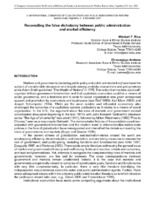| dc.contributor.author | Rice, Mitchell F. | |
| dc.contributor.author | Arekere, Dhananjaya | |
| dc.date.accessioned | 2018-09-02T05:18:36Z | |
| dc.date.available | 2018-09-02T05:18:36Z | |
| dc.date.issued | 2001-11 | |
| dc.identifier.uri | http://cladista.clad.org//handle/123456789/1944 | |
| dc.description.abstract | The juxtaposition in roles between government and markets has received limited attention in the public administration literature. Generally, government-viewed as a sluggish, inefficient, non-transparent and a corrupt entity, is seen as an adversary to the market-viewed as a dynamic, efficient, transparent and a non (or less) corrupt sector. Government intervention in markets has been viewed as undesirable because it is thought to promote transaction costs and hinder benefit maximization. | |
| dc.description.abstract | This argument can be misleading if the long-term negative consequences and future costs of market failure and the lack of regulations are not taken into account. Both the private and public sectors are often driven by goals that are seemingly contradictory. That is, maximizing private versus public benefits may not always yield identical outcomes. However, the important facilitating role the public sector plays in ensuring that private activities in an exchange economy take place within a framework of de jure and de facto codes and ethics is undisputable. Yet, only a few scholars have been able to recognize the complementary nature of public and private sector agents, and argue that markets function within a broader institutional setting. | |
| dc.description.abstract | This paper explores this idea further using regulated and unregulated markets to reinforce the notion that market efficiency in most settings is attainable only under a set of public policies (regulations) that are enforced by public administrators to minimize long-term transactions costs in an uncertain and risky future. The seemingly high value of the transactions cost imposed due to the regulations could indeed be lower in comparison to costs resulting from market failure or other inefficiencies absent public policies. Specifically, the paper demonstrates two important points. | |
| dc.description.abstract | First, the paper argues that in the absence of appropriate public institutional settings markets do not function efficiently. Second, the paper argues that public administrators who influence policymaking at all government levels are even more instrumental in making sure that the policies and regulations are enforced, monitored, and evaluated. The roles of public administrators are important ones for market efficiency. | |
| dc.format.extent | 10 p. | |
| dc.language | Inglés | |
| dc.publisher | Texas A&M University. The Bush School of Government and Public Service | |
| dc.rights | Creative Commons BY-SA-NC 4.0 Int | |
| dc.rights.uri | http://creativecommons.org/licenses/by-nc-nd/4.0/ | |
| dc.subject | CONGRESO CLAD 6-2001 | |
| dc.subject | MERCADO | |
| dc.subject | ECONOMIA DE MERCADO | |
| dc.subject | FUNCION DEL ESTADO | |
| dc.subject | INTERVENCION DEL ESTADO | |
| dc.title | Reconciling the false dichotomy between public administration and market efficiency | |
| dc.type | article | |
| clad.congress | Congreso Internacional del CLAD sobre la Reforma del Estado y de la Administración Pública, 6 | |
| clad.key | MFN31796--31796 | |
| clad.key1 | KEY31796 | |
| clad.md5 | 29cdf8471c810bb30f8722fa15ceff7a | |


